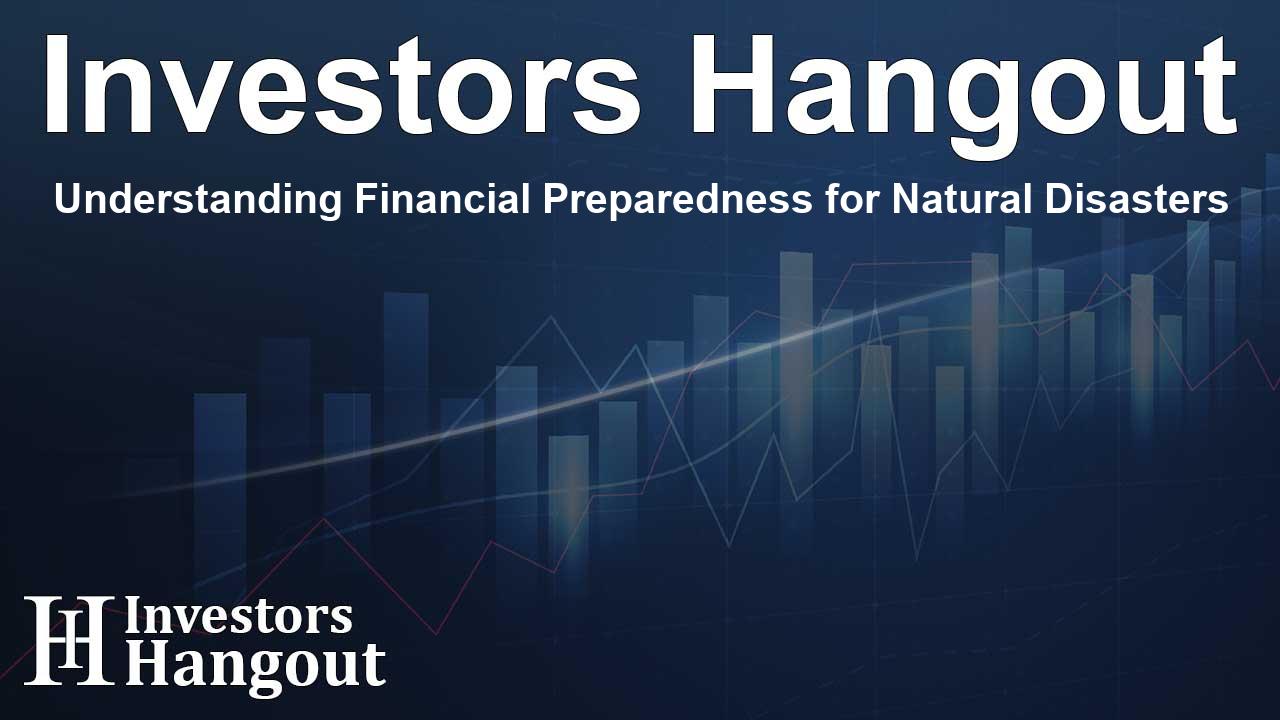Understanding Financial Preparedness for Natural Disasters

Understanding Financial Preparedness for Natural Disasters
Surveys reveal that a concerning one-third of Americans are unprepared financially for natural disasters, which can significantly impact their livelihoods. This situation highlights the critical need for better awareness and proactive measures regarding financial planning in the face of potential emergencies.
Survey Insights on Financial Preparedness
A recent survey has shown that two-thirds of Americans recognize that a natural disaster would adversely affect their finances. However, the alarming statistic emerges that 32% have not taken any financial steps to safeguard themselves. With natural disasters posing severe threats daily, this lack of preparedness can lead to substantial financial consequences.
Financial expert Eva Simpson remarks that many fail to consider their financial situations during disaster preparation. Yet, post-disaster, the reality of financial management becomes starkly clear. Taking thoughtful financial measures prior can help mitigate potential losses and ultimately facilitate quicker recovery for individuals and businesses alike.
Key Actions for Individuals to Prepare Financially
Many Americans are gradually adopting essential financial preparedness measures. The leading actions include evaluating insurance policies (31%) and creating an inventory of possessions (30%). However, efforts like updating estate plans remain low (19%). These elements reflect the mixed response among individuals regarding financial readiness.
Create an Emergency Fund
An emergency fund can serve as a financial cushion, keeping resources available for necessary repairs after a disaster. Having cash readily accessible can be crucial when traditional banking services are disrupted.
Review Insurance Policies
Reviewing one's insurance policies is an essential step in preparing for disasters. Homeowners and renters should ensure their coverage aligns with their needs. It is advisable to engage a qualified insurance agent to ensure proper protection.
Protect Important Financial Documents
Keeping essential documents safe is vital. Consider securing identification records, insurance papers, property deeds, and wills in a fireproof and waterproof safe or deposit box.
Establish an Estate Plan
An estate plan is another foundational aspect of financial readiness. It should include a living trust, power of attorney, healthcare proxy, and plans regarding beneficiaries. Consulting with professionals can help guarantee that arrangements are in line with personal goals.
Advice for Businesses Facing Natural Disaster Challenges
Business owners express substantial concerns about potential financial setbacks following disasters. A significant 63% worry about their financial stability if a natural disaster impacts their operations. The top worries include lost revenue from disruptions, loss of clientele, and damage to physical assets.
Enhance Communication Strategies
Establishing reliable communication channels in advance is crucial. Schools, organizations, and businesses should implement diverse messaging platforms and ensure that all staff are familiar with these systems.
Plan for Remote Work
Having a plan in place for remote operations post-disaster is essential. Businesses should ensure their systems are accessible from various locations and regularly test access and operational capabilities.
Data Protection Strategies
Investing in a robust data backup system is imperative. Utilizing off-site or cloud storage options, ensuring cybersecurity measures, and training staff in these protocols can significantly enhance protection.
Physical Workspace Preparedness
Evaluating the business's vulnerability to disasters and preparing backup plans for alternate workspaces can alleviate some anxiety. Keeping emergency supplies at hand can further aid in recovery efforts.
In summary, financial preparation for disasters is necessary for individual and business welfare. Although the prospect of planning may seem daunting, taking action now can lead to peace of mind and greater resilience during challenging times.
Frequently Asked Questions
What percentage of Americans have not prepared financially for disasters?
About 32% of Americans have not taken any financial steps to prepare for a natural disaster.
What are some recommended steps for individuals to prepare financially?
Individuals should create an emergency fund, review insurance policies, protect important documents, and establish an estate plan.
Why should business owners plan for disaster recovery?
Business owners should plan for disaster recovery to minimize financial losses, ensure operational continuity, and protect valuable assets.
What should businesses focus on when preparing for disasters?
Businesses should focus on effective communication strategies, remote work planning, data protection measures, and preparedness for workspace disruptions.
How can individuals safeguard their financial documents?
Financial documents should be stored in a fireproof and waterproof safe, or a secured safe deposit box to protect them from disaster-related damage.
About The Author
Contact Henry Turner privately here. Or send an email with ATTN: Henry Turner as the subject to contact@investorshangout.com.
About Investors Hangout
Investors Hangout is a leading online stock forum for financial discussion and learning, offering a wide range of free tools and resources. It draws in traders of all levels, who exchange market knowledge, investigate trading tactics, and keep an eye on industry developments in real time. Featuring financial articles, stock message boards, quotes, charts, company profiles, and live news updates. Through cooperative learning and a wealth of informational resources, it helps users from novices creating their first portfolios to experts honing their techniques. Join Investors Hangout today: https://investorshangout.com/
The content of this article is based on factual, publicly available information and does not represent legal, financial, or investment advice. Investors Hangout does not offer financial advice, and the author is not a licensed financial advisor. Consult a qualified advisor before making any financial or investment decisions based on this article. This article should not be considered advice to purchase, sell, or hold any securities or other investments. If any of the material provided here is inaccurate, please contact us for corrections.
